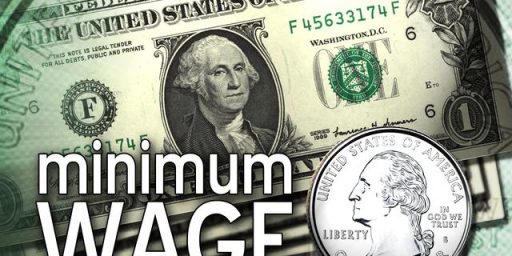RESTAURANT ECONOMICS
Kevin Drum isn’t too happy with California restaurant owners who are trying to get out of paying the $6.75 minimum wage to waiters, on the grounds that they make tips.
They just want to increase earnings so they can pay their long suffering executives higher salaries.
It never ceases to amaze me that businessmen are continually so outraged over the possibility that any decent paying non-executive jobs are left in our country. But they are. If you’re just an ordinary schlub working in an ordinary job, you don’t deserve a decent wage, you don’t deserve decent healthcare, and you don’t deserve any job security. And don’t you forget it.
So the next time some idiot in a suit starts prattling on about liberals and class warfare, take a minute to remind him who started it. And don’t bother being polite about it.
His commenters mostly take him up on the closing sentence.
Kelly Sedinger makes a pretty compelling case that servers in even relatively low price restaurants make quite a good living.
Now, I’m in New York and not California, so it may well be that he’s right, as far as California goes. I was shocked to see that California mandates an hourly minimum of $6.75 for tipped employees, because here in New York that figure is $2.90 an hour. That’s right, servers in New York get paid less per hour than the regular minimum wage, and they are expected to make up the difference in their tips. They are required to claim the amount of tips they make at the end of each shift, and in the event that this amount is not enough to bring their total hourly rate for the shift up to minimum ($5.25, last time I needed to know this), the restaurant is required to make up the difference.
Servers at the restaurants where I managed would occasionally try to either underclaim their tips so as to force us to pay them the difference, or at least they would complain that they weren’t making the hourly difference in the middle of the shift. Our response was this: To equal the hourly minimum in an standard, eight-hour shift, a server must be able to make all of $19 in tips, and a server who can’t make $19 in tips, in eight hours of waiting tables, is probably a server who doesn’t belong waiting tables in the first place, unless something has happened in that shift to utterly kill business for that day. How much work does this entail, then? Well, if that server waits on just one table each hour (a stretch of an assumption), and that table spends just $20 (a fairly median amount in the restaurants I worked) and tips the straight 15%, that server will make $24 in tips, which is more than the amount needed to make minimum.
Indeed, I think all the states where I’ve lived had an exception in the minimum wage laws for occupations where tips were standard.





“makes quite a good living”? Uh, you have got to be kidding. Let’s do the math again, and see exactly what a great living our NY waiter has going for himself. Let’s even assume he doesn’t take a holiday, or pay taxes, or anything else.
52 weeks * 5 working days * 8 hours * $5.25 = $10,920 annual.
In CA, with their insanely high minimum wage requirement, there’s even more “good living”, on wages like this:
52 weeks * 5 working days * 8 hours * $6.75 = $14,040 annual.
Yes, they’ll make tips on top of that, but once again, these minimums aren’t much. I’m reasonably confident that Kelly, you, or I wouldn’t be all that happy about living on this kind of money, especially in CA or NY.
Ross,
Read Kelly’s post. The tips are way, way more than the base income.
OH GOODY- We don’t have to be polite!
So I can say that Kevin is a freaking moron who would not know an economic fact if it bit him on the ass!
Further, I can say if he had a brain in his head he would know that waitrons are among the higher paid people in the service industry. When was the last time you saw a bag boy that worked the same grocery store for 20 years? Go to even a modest 3 star restaurant and ask your server how long they have been in the business and how they like it.
If Kevin had the observational skill of a rat he would have noticed that many people make a career of being a waitron because the money is very good.
I know firsthand many waitrons that have luxury sedans and own nice homes. LIKE ANY PROFESSION the ones who are good at it get paid well and the ones who suck, don’t get paid well.
Kevin is too stupid to figure his out.
And thanks to the fact that he says we don’t have to be polite and I call him a complete freaking moron for not knowing this.
Paul
As a single data point I will cite my regular waitress at a local restaurant. She is married to a waiter at the same restaurant and she gets new car every 3 years. They own a nice home in a very good neighborhood. She just had her first child and now only works 3 days per week. The school she has chosen for her daughter is in the upper 50% in the tuition range and she loves her schedule. She also never lets my water glass get dry and she smiles a lot. I tip her 20% all year and give her a few bucks at Christmas. One Christmas she was had a few problems and I gave her a $100 in addition to the 20%. So flaming liberals who say that conservatives try to harm waitrons really piss me off. He is stupid beyond belief.
There are several problems in Drumm’s reasoning (as usual)
1. Average restaurant owner is not some high paid exec. The average owner is some small business owner or mom-and-pop family operation (Olive Garden, Red Lobster and the other mass outlets – with crappy food in my opinion – are the exception and not the norm). These owners make a middle class living if their place makes it, bnging me to the next point
2. Drumm must be of the opinion that the restaurant business is some gold mine. Guess what percentage of restaurants fail in the first year of operation? Would the number 70% surprise you? (remember we are talking places with wait staff so fast-food places don’t count)
3. Higher salaries mean higher prices, which mean people will eat out less, which mean less restaurants, which mean less employed wait staff.
So the choice is fewer people employed at higher wages or more people employed at lower wages. Drumm rather have more unemployed waiters while the ones who work make higher wages. Fine, that’s one opinion, but let’s not bring “executive pay” into it since it is really nonsense – most restaurants don’t have executives.
Normally, I’m as happy as anyone to beat on Kevin, but not this time.
Minimum wage should be just that… a MINIMUM.
So let’s look at the economic argument for a moment. If higher prices make eating out more expensive, you should ask how much more expensive.
If that waiter is only waiting on one table of four people an hour, that is a net increase of .40 cents per diner per dollar of wage. To me, that sounds quite modest.
I’m using the 150% wage rule to calculate the employer’s true cost of wages.
If business is that slow for the owner, the waiter will soon be out of work anyways.
I live in California, no shortage of restaurants here.
Yeah- Most of the “executives” to which Kevin Dumb is referring work 60-80 hours a week and are praying every night for a full house so they can make payroll.
Kevin usually makes moronic posts but this one really shows what an uninformed bigoted idiot he really is.
Jimbo.. I think you missed the point…
“Minimum wage should be just that… a MINIMUM
They get paid a lower BASE on the assumption they will make the balance in tips. IF THEY DON’T the restaurant is STILL required to pay them a higher minimum. (so you get your wish)
The restaurant is NOT require to pay 6 something an hour to a waitperson who is making 20 bucks an hour on tips over and above their pay.
If you fully understand the system it is very fair to all 3 parties. (the owner, the waiter and the IRS who have their hands in the till as well)
By way of discussion, I’ll tell you something you probably don’t know.. Waitrons are required by law to pay a percentage of their gross sales to the IRS as taxes. So if a waitron drops 500 bucks in food, the IRS assumes a figure (I think it is like 8% I forget) and they are taxed as if an 8% tip is assumed. So if you stiff your server they actually lose money because they pay tax on the tip you kept in your pocket.
Also if you put the tip on the card, they pay full tax on the whole tip. (that’s why I tip in cash) And in most houses the wait staff must wait until the end of the month to collect their tip money from charge cards.
It can be a complex system but it really is fair to everyone.
A little research on Kevin’s part would have informed him of all of this but what would have been the fun in getting his facts right?
Paul
Notice the last dig was at him and not you Jimbo.
Jimbo,
If a waiter is only waiting on one table of four an hour, he’ll soon be unemployed. Either they have way too much waitstaff or the restaurant is about to go under.
Uhhh… that’s what I said James.
“They get paid a lower BASE on the assumption they will make the balance in tips. IF THEY DON’T the restaurant is STILL required to pay them a higher minimum. (so you get your wish)”
Paul, if that is the case (and I have no reason to doubt you) then I’m OK with it.
Has anybody, without an axe to grind, ever done a study on what the real effects are on the economy and employment market by raising or lowering the minimum wage?
Well Jimbo, that “without an axe to grind” part pretty much kills the rest of your question. Anybody studying it can be accused of some bias. Cato studies things like this and while they might be accused of being biased to the right, they usually have very sound methodology. Even many on the left respect thier work.
A quick google finds this. http://www.cato.org/pubs/pas/pa106.html
I have not read it, but it is probably sorta what you are looking for. However it is about the general topic of minimum wage and not how it works in the rather odd restaurant biz.
P
—